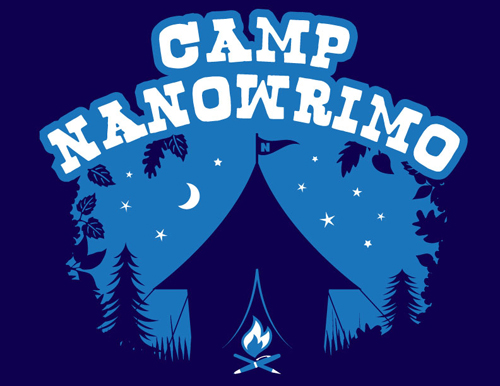

Most authors and even a good number of readers have at least heard of NaNoWriMo–National Novel Writing Month–if not actually participated themselves. Staged each year in November, the high-pressure event has given rise to a number of bestselling books both traditionally and self-published, including titles like Water for Elephants and Hugh Howey’s Wool. At last year’s event, more than 500,000 participants around the world signed on to crank out a 50,000-word novel in 30 days’ time.
The growing popularity of NaNo, the fact that a number of participants had trouble with the timing of the event, and the desire for more opportunities than just once a year have given birth to two different events that follow much the same concept: Camp NaNoWriMo. The camp is a month-long virtual writer’s retreat with an outdoorsy theme, which still challenges participants to write every day and maintain some level of discipline about it.
The first of the two Camps kicks off today, and writers awoke today–yes, April Fools’ Day–to hammer out their word counts. But one of the ways that Camp NaNo offers writers a different sort of motivation than even a typical November NaNo is that it is a lower-pressure sort of event that instead focuses on giving writers the opportunity to broaden their writing experiences. Participants are invited to write any type of project, like poetry, screenplays, short stories, and of course, novels.
In a BiblioCrunch Twitter chat on Camp NaNoWriMo, Grant Faulkner, executive director of National Novel Writing Month, said, “You can design your own creative writing retreat in Camp NaNoWriMo. It’s difficult to try to immerse oneself in creativity. Nano puts creative immersion on the calendar.”
NaNo novels have been looked down on in recent years as being rush jobs that authors put to market far too quickly, but the writing itself is meant only to be a tool for authors to hold themselves accountable to a daily word count and to focus on their own writing processes for thirty days. The end result may need a lot of polishing (with a chainsaw, even), but as an exercise in discipline and craft, it’s a vital tool.
Participants can still sign up to take part in this month’s Camp NaNo at http://campnanowrimo.org.
Mercy Pilkington is a Senior Editor for Good e-Reader. She is also the CEO and founder of a hybrid publishing and consulting company.
